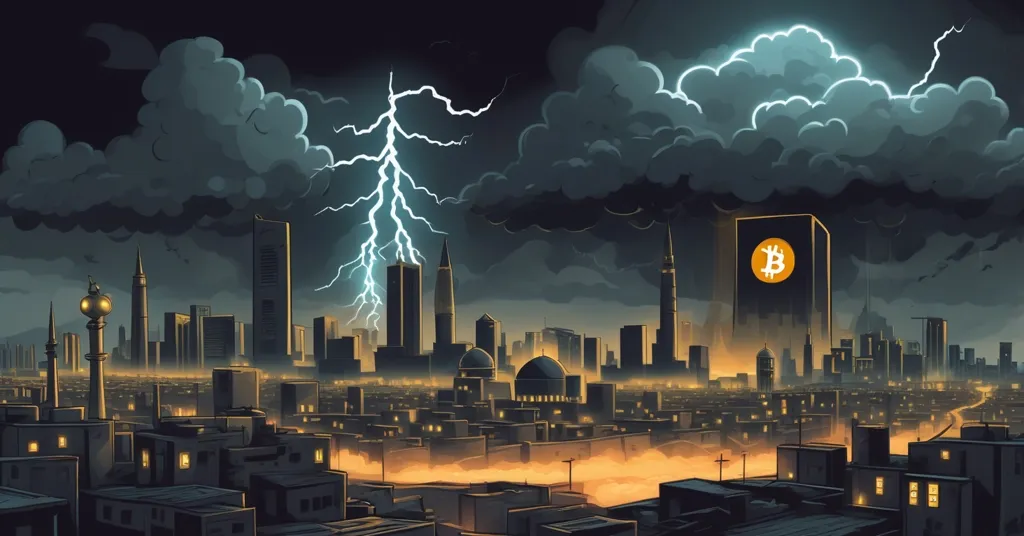Iran Faces UN Sanctions Over Nuclear Deal Collapse: Crypto’s Role Explored

Iran Slammed with UN Sanctions Over Nuclear Deal Failure: Snapback Mechanism Unpacked
Tehran is back under the global spotlight as UN sanctions come roaring back after Iran blew past a critical 30-day deadline set by Western powers. This latest flare-up in the crumbling 2015 nuclear deal—officially the Joint Comprehensive Plan of Action (JCPOA)—marks a perilous turn in Iran’s nuclear saga, with potential shockwaves reaching into the realm of Bitcoin and decentralized finance as the country grapples with financial isolation.
- Sanctions Snap Back: UN restrictions reinstated Saturday night after Iran ignores E3 (UK, Germany, France) demands under the JCPOA’s snapback clause.
- Iran’s Stubborn Stand: Supreme Leader Khamenei brands US talks “surrender,” while uranium enrichment hits a near weapons-grade 60%.
- Broader Fallout: With diplomacy in ruins and sanctions tightening, could crypto like Bitcoin offer Iran a financial escape, or just more trouble?
The JCPOA’s Downfall: A Deal Gone to Hell
The return of UN sanctions on Iran is a grim reminder of how far the 2015 JCPOA has fallen. Once hailed as a diplomatic breakthrough, the agreement—inked by Iran, the US, the E3 (UK, Germany, France), Russia, and China—promised to rein in Iran’s nuclear program in return for sanctions relief. That hope imploded in 2018 when the US, under Donald Trump, walked away and hit Tehran with brutal economic penalties, tanking its currency and sparking a vicious cycle of retaliation. Now, the crisis has hit a new low. The E3 activated the snapback clause—a built-in fail-safe in the JCPOA that automatically reimposes sanctions if terms are violated—after Iran flat-out refused a 30-day ultimatum to restart nuclear talks with the US, fully cooperate with the International Atomic Energy Agency (IAEA, the UN’s nuclear watchdog), and account for a hefty 408-kilogram stash of uranium enriched to 60%, teetering on the edge of weapons-grade status.
Iran’s Nuclear Gamble: Too Close for Comfort
If you’re new to the nuclear game, here’s the basics: uranium enrichment ramps up the concentration of uranium-235, the key isotope for nuclear power—or bombs. At 60%, Iran’s stockpile is a mere step from the 90% level generally seen as weapons-grade, setting off red alerts across Western capitals and beyond. The IAEA, tasked with keeping tabs on Iran’s activities, has been repeatedly stonewalled, leaving the world guessing about Tehran’s true aims. The E3’s demands weren’t some bureaucratic checkbox; they were a frantic push to yank Iran back from a ledge that could destabilize the entire Middle East. Iran’s reply? A hard pass. Supreme Leader Ayatollah Ali Khamenei didn’t hold back, slamming any negotiation with the US as a shameful “surrender” and “disgrace,” a stance echoing decades of bad blood with the West.
Iran’s recently elected President Masoud Pezeshkian, a reformist navigating a hardline-dominated system, doubled down on the distrust while trying to project a sliver of openness. His words paint a vivid picture of the deadlock:
The wall of mistrust that has been created between us and the Americans is quite thick and quite high. Every step that we take forward, they [US] take two steps back and add more conditions. First show us your sincerity and your good will and we will take two steps towards you.
On sticking with the Non-Proliferation Treaty (NPT), a global agreement to halt the spread of nuclear weapons, Pezeshkian acknowledged internal hardliner pressure to bail but confirmed Iran’s current position under Khamenei’s iron rule, while leaving the door cracked for future pushback:
Certain people inside the country think that we certainly should leave the NPT . . . but the supreme leadership held steadfast . . . and that’s our official policy. But if they implement the snapback mechanism and subsequent mechanisms, then we need to know how to respond.
Global Tensions and Military Strikes: A Deadly Dance
This isn’t just a war of words—it’s a clash forged by hostile actions on every front. Since the US ditched the JCPOA, Iran has cranked up its nuclear program almost as a deliberate provocation, enriching uranium way beyond agreed limits. The stakes skyrocketed in June when Israel, with brief US support, unleashed a 12-day barrage on Iranian nuclear sites just before planned indirect talks with Washington. The strikes inflicted serious damage—though not the total “obliteration” Trump bragged about, as Western diplomats clarified the facilities still limp along. The attacks didn’t just dent infrastructure; they obliterated any faint hope of dialogue. Iran promptly froze cooperation with the IAEA, and while a half-hearted “new modality” for inspections was hashed out this month, European officials scoffed at it as useless without real access to core sites. The world’s left squinting in the dark, unable to confirm if Iran’s creeping toward a bomb or just flexing for leverage.
At the UN Security Council, Russia and China tried to buy Iran breathing room with a resolution to delay the snapback deadline, but only 4 of 15 members bit, highlighting a fractured global stage. Other key players, like India and Turkey with economic ties to Iran, have played it cagey, dodging alignment with either camp in a mess where no one’s hands are clean.
Sanctions’ Brutal Toll: Crushing Ordinary Iranians
Make no mistake—these UN sanctions aren’t just a diplomatic middle finger; they’re a chokehold on Iran’s economy, already on its knees from years of restrictions. Inflation has soared past 40% at times, the rial’s value has cratered, and everyday Iranians scrape by, struggling for basics like medicine and food as imports dry up. Being locked out of SWIFT—the global banking network for cross-border payments—cuts Tehran off from traditional finance, forcing transactions into shadowy corners. This kind of economic despair often spawns black markets, and while Iran’s iron grip on internet access and capital movement stifles options, the murmur of cryptocurrency as a workaround grows louder. But let’s not gloss over the human cost: sanctions hammer the vulnerable hardest, and no digital coin can erase that pain overnight.
Crypto’s Risky Role: Lifeline or Landmine?
For those of us championing Bitcoin and decentralization, Iran’s predicament is a glaring case study in why alternative financial systems are game-changers. Barred from SWIFT, countries like Venezuela and reportedly North Korea have leaned on crypto to skirt sanctions, exploiting Bitcoin’s borderless muscle to shift funds under the table. Iran could be next—its tech-savvy younger generation and knack for dodging restrictions make it a real possibility. Bitcoin, with its heavyweight status and relative stability over wild-card altcoins, might lead the charge, though privacy-focused coins like Monero could carve out a niche for stealth transactions. As decentralization advocates, we see the appeal: crypto can hand power back to individuals, a middle finger to overreaching financial gatekeepers. Imagine Iranian citizens sidestepping sanctions to buy medicine or store value as the rial burns—freedom in code.
But hold the champagne. Iran’s regime keeps a tight leash on digital access, and crypto’s a double-edged blade. It can liberate, sure, but it can also empower the worst actors—think ransomware gangs or illicit trade networks. Let’s not pretend it’s all rosy; decentralization doesn’t pick sides, and global watchdogs are already sniffing around crypto’s role in sanctions evasion. If Iran goes full throttle on Bitcoin, expect crackdowns or even weaponized regulation to follow. Could decentralized tech be Tehran’s financial backdoor, or just another Pandora’s box? History leans toward both, and we’d be naive to bet on a clean win. For Bitcoin maximalists like myself, the network’s dominance makes it the prime candidate over flash-in-the-pan altcoins, but even I’ll admit other protocols might fill gaps Bitcoin doesn’t touch—privacy being the big one.
Counterpoint: Do Sanctions Even Work?
Stepping back, let’s play devil’s advocate for a second. Are sanctions even worth the paper they’re written on? They’ve crushed Iran’s economy and punished its people, no question, but have they stopped Tehran’s nuclear march? Hardly. Some argue this approach just hardens defiance—decades of pressure haven’t bent Iran, so why double down on a broken playbook? The West’s obsession with punitive measures often ignores how they drive nations into corners, breeding resentment over reform. Meanwhile, Iran’s leaders spin sanctions as proof of Western malice, rallying domestic support. If anything, this cycle might push Tehran deeper into risky alternatives—nuclear or crypto—than any carrot-and-stick routine ever could. Isn’t it time for a new strategy, or are we doomed to replay this tired standoff?
Where Do We Go From Here?
Looking ahead, the horizon’s anything but bright. The mistrust between Iran and the US isn’t just a hurdle; it’s a fortress stacked with grudges. Every half-step toward talks gets crushed under military boots or political stunts. Israel’s strikes, Trump’s chest-thumping, and Iran’s uranium hoarding aren’t random—they’re a slow march to a breaking point. Pezeshkian might sound a tad less combative than past leaders, but with Khamenei holding the reins, compromise is blasphemy in Tehran. The snapback sanctions are now reality, but don’t expect a tidy ending. Iran’s got a track record of biting back—be it nuclear escalation, regional meddling, or digital warfare. The West, meanwhile, seems glued to sanctions and frowns, lacking the guts for the kind of daring diplomacy that spawned the JCPOA. As this nuclear chessboard heats up, decentralization looms as a wild card—will it spell freedom or fuel the fire?
Key Questions and Takeaways on Iran’s Nuclear Crisis and Crypto’s Potential
- What caused the reinstatement of UN sanctions on Iran?
The E3 (UK, Germany, France) triggered the JCPOA’s snapback clause after Iran missed a 30-day deadline to engage in nuclear talks with the US, work with the IAEA, and clarify a 408-kilogram stockpile of uranium enriched to 60%. - Why is Iran so opposed to negotiating with the US?
Supreme Leader Khamenei labels such talks “surrender,” a view rooted in deep distrust from the US’s 2018 JCPOA withdrawal and aggressive moves like military strikes. - How advanced is Iran’s nuclear program right now?
Since the JCPOA fell apart, Iran has enriched uranium to 60%, a short leap from the 90% weapons-grade mark, using it as both a taunt and a bargaining tool. - What effect have military actions had on this crisis?
Israeli strikes, with brief US support, damaged key nuclear sites and sank planned talks, cementing Iran’s hostility and making diplomacy a pipe dream. - Could Bitcoin or crypto help Iran dodge sanctions?
Bitcoin and other cryptocurrencies might bypass barriers like SWIFT exclusion, but Iran’s strict controls and the risk of enabling illicit activity make it a gamble with high stakes. - Are sanctions an effective tool against Iran’s nuclear ambitions?
While they devastate Iran’s economy and citizens, critics say sanctions entrench defiance rather than deter, questioning the West’s repetitive hardline tactics in this nuclear standoff.



